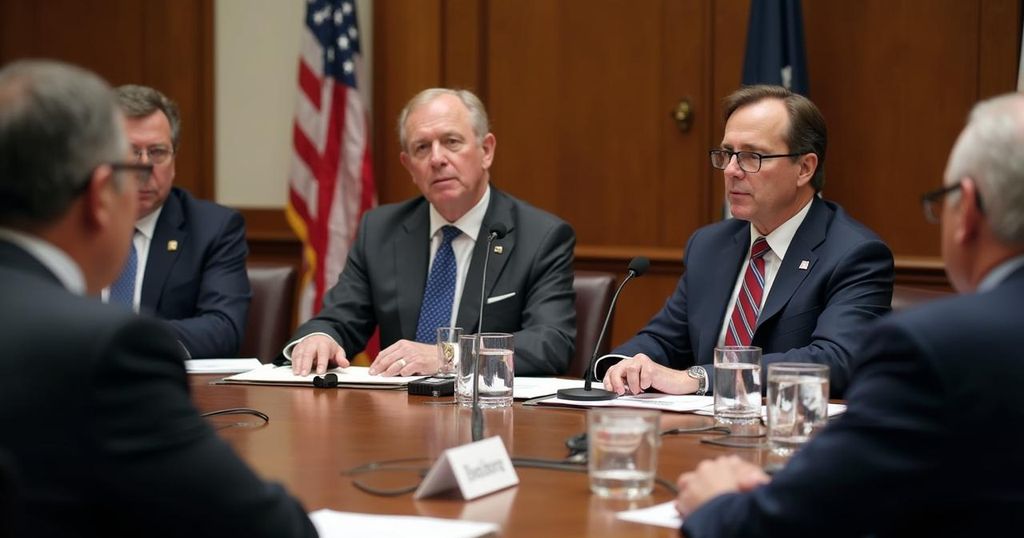Mike Johnson’s Unsubstantiated Claims on Election Integrity and Voter Fraud

House Speaker Mike Johnson has claimed, without evidence, that there will be cheating and non-citizen voting in the 2024 elections, echoing unfounded assertions of fraud in the 2020 elections. His remarks raise questions about electoral integrity and state regulations on voter registration. Johnson has left open the possibility of not certifying election outcomes based on his proposed conditions for fairness, drawing criticism from political peers like Liz Cheney concerning his commitment to proper constitutional procedures.
In a recent interview on CBS’s “Face the Nation,” Republican House Speaker Mike Johnson expressed unsubstantiated concerns regarding potential “cheating” in the upcoming 2024 elections, echoing claims that non-citizens will try to cast votes. Johnson’s remarks come as part of his long-standing skeptic stance on the electoral process, particularly since he opposed the certification of President Joe Biden’s election victory in 2020. “I think there is going to be some cheating in this election,” Johnson asserted, speculating that non-citizens might be able to vote due to lax regulations in certain states. When pressed by moderator Margaret Brennan on the legality of non-citizen voting, he acknowledged that it is indeed against the law but pointed to what he described as a failure by some states to enforce proof of citizenship during voter registration. Johnson later referenced actions by Virginia Governor Glenn Youngkin to address voter roll issues, a move currently challenged by the Department of Justice, which argues that Virginia’s actions contravene federal election law requirements under the National Voter Registration Act. This law stipulates a 90-day “quiet period” before elections to allow voters to correct any inaccuracies. Despite voicing confidence in state measures to secure election integrity, Johnson’s assertions simultaneously fostered skepticism about the legitimacy of future elections, as pointed out by Brennan. He further pushed conspiracy theories regarding immigration policies purportedly aimed at increasing Democratic voter numbers without evidence to support his claims. When discussing potential challenges to the certification of election results in 2025, Johnson stated he hopes and prays there will be no repeat of the January 6 Capitol riots. Yet, he left open-ended whether he would certify a Biden or Harris victory, emphasizing conditions of a “free, fair, and legal” election. Former Representative Liz Cheney expressed mistrust in Johnson’s commitment to upholding constitutional obligations should he face a situation where a Democrat wins, citing his knowledge of inaccuracies in Trump’s 2020 fraud claims.
The article centers around House Speaker Mike Johnson’s recent comments concerning potential election integrity issues for the upcoming 2024 presidential election. He insinuates that there may be non-citizens voting and general cheating, which aligns with a broader narrative from certain political circles, particularly among Republicans, who have been vocal about perceived vulnerabilities in the electoral system since the 2020 election. This discourse has been particularly charged, as it involves ongoing discussions about voter registration laws, state actions on voter rolls, and historical concerns about voter fraud. It highlights the contentious nature of electoral integrity debates in the United States, marked by legislative proposed measures and legal challenges surrounding voting rights and election law enforcement.
In conclusion, Speaker Mike Johnson’s statements regarding potential cheating in the upcoming 2024 election reflect a significant ongoing narrative questioning the integrity of the electoral process. Without presenting concrete evidence, Johnson maintains that non-citizen voting may occur, garnering criticism from various quarters, including journalists and political figures. As discussions continue about voting rights, elections, and potential legislative measures, the concerns raised by Johnson may influence public sentiment and preparedness regarding the electoral process into 2024 and beyond.
Original Source: www.rollingstone.com






